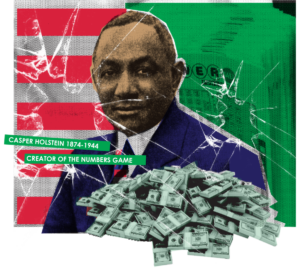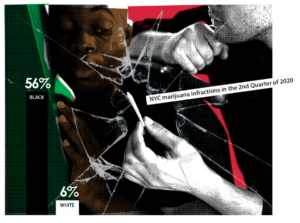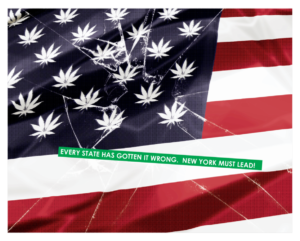Op-Ed: Leave the marijuana industry in the hands of those who built it
By Maria Granville -2/1/2020
Believe it or not, New York State’s thriving lottery system, which raised over $10.2 billion in revenue in FY2019, was invented by a Black man, Casper Holstein.

“The Bolito King” Casper Holstein
Known as “The Bolito King,” Holstein, an entrepreneur and philanthropist, is considered the father of the so-called “numbers.” In the early 1920s he devised a way to randomly select winning numbers using US Customs House receipts and the Stock Exchange daily volume – without the prospect of rigged results.
The numbers game went on to employ over 100,000 people across the five boroughs, finance local businesses, and create generational wealth.
In 1980 New York State decided to legalize the $800 million to $1.5 billion dollar business. Dead set on cutting the current operators out of the business, officials rejected solutions that would have legitimized their businesses and saved their jobs. Instead, they opted to deride them as tax evaders and criminals while eliminating their livelihoods.
New York State is again eyeing a thriving illegal market, built predominantly by Black people who have borne the brunt of unequal enforcement while making a living for themselves, their families, and their communities. The racial disparities of arrests for marijuana offenses in New York City are staggering – in the second Quarter of 2020, 56 percent of people arrested for marijuana infractions are Black. Six percent are white.

Estimates of the size of the current illegal market for marijuana in the state range from $1.74 billion to $3.5 billion annually. Using these estimates, the legalized market is expected to generate between $248 million to $677 million in tax revenue, depending on the tax rate and price per ounce.
Governor Andrew Cuomo’s proposed law does nothing to save the livelihoods of current operators. On the contrary, the Governor’s proposed legislation would make possession of any amount of illicit marijuana an arrestable offense, continuing the disparate treatment in enforcement of Black people.
Sound familiar?
The COVID-19 pandemic, and the May 25, 2020 killing of George Floyd, have caused a long overdue awakening – the recognition that systemic racism has a profoundly negative effect on the health and economic well-being of the Black community.
According to the Federal Reserve Bank of New York, Black business ownership in the state fell 70% between February and June 2020. State sponsored destruction of New York’s current marijuana entrepreneurs through legalization cannot be allowed to exacerbate the disparate outcomes Black people face because of racist policies that continue to deny wealth building opportunities and healthy communities.
Leave the marijuana industry in the hands of those who built it!
Marijuana legalization is the vehicle to start reversing the effects of systemic racism on the Black community. Marijuana legislation must contain Economic Restorative Justice provisions crafted with a single goal – to create as many successful Black-owned businesses as possible. Every opportunity should be taken to develop legislation that meets this goal.
The legislation must contain language that narrowly defines who can benefit from restorative provisions. We use the term “most harmed” – strictly defined as an individual who was arrested, convicted, or incarcerated for possession of marijuana, or these individuals’ immediate family members, or individuals who resided in communities negatively impacted by aggressive policing prior to 1980. This definition includes all races, genders, veteran status, and sexual orientations and ensures only those who have experienced the consequences will benefit.
There are currently ten medical marijuana license holders in New York State, and countless well financed West Coast actors anxiously waiting to enter the market. The legislation must include an incubation period of at least five years that provides recreational licenses only to restorative justice applicants so they can compete on a more level playing field.
Seventy five percent of the tax revenue should be deposited in community reinvestment funds that promote economic empowerment in the communities most harmed.
Community-based business and workforce development organizations must be funded to provide the high-touch C-level technical assistance that Black entrepreneurs will need to successfully launch and sustain legal marijuana enterprises.

Numerous states that have legalized adult use recreational marijuana have restorative justice provisions in their legislation. Not one state has gotten it right, partly because restorative justice was not the main priority of legalization. New York must not follow suit.





Trackbacks & Pingbacks
[…] our entrepreneurial industries led and operated by Black people to be taken from us, such as “numbers” invented by Casper Holstein that employed more than 100,000 Black and Brown people across the five boroughs. Marijuana cannot […]
Comments are closed.